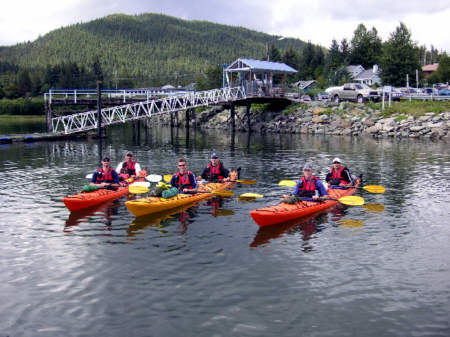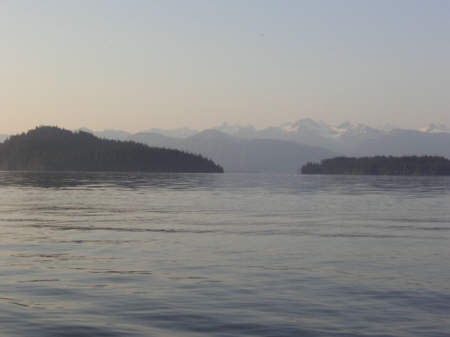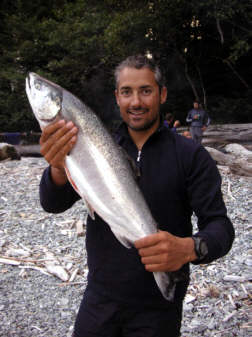Kayaking Expedition ‘Alaskan Voyage’, Alaska / Canada, July / August 2005
RMR London
During July/August a 6-man team from RMR London set out to kayak the Inside Passage, an intra-coastal route along the Pacific coast from Juneau (Alaska) to Prince Rupert (Canada). Known as the Inside Passage, the route weaves its way through the desolate wilderness of the Alexander Archipelago, occasionally open to the full force of the ocean but more often bounded by islands, mountains and glaciers. The area is almost entirely uninhabited so we planned to be self-sufficient throughout, carrying sufficient rations and provisions for three weeks in the field.
Our two-man kayaks were acquired locally (www.juneaukayak.com) and proved themselves to be immensely robust and stable. Built neither for comfort nor for speed, the quickest we could manage was around 4 knots, and even this sedate speed was often reduced due to headwinds and adverse tides and currents. The result was an average 8+hours per day of high-intensity paddling in what quickly became known as the "pain locker".
 Start day |
Uncomfortable and slow as the kayaks were, the effort was more than compensated for by the stunning scenery and abundant wildlife. Humpback whales surfaced adjacent to the boats, orcas tracked our progress from a distance, inquisitive seals and sea-lions popped up at every corner, while our campsites were visited by occasional moose, sea otters and porcupines. Also of note was the incredible abundance of salmon, which we found migrating up streams and rivers in tens of thousands. Since they took no interest in Maj Steve "J R Hartley" Mannion’s fishing line, we resorted to bashing them over the head with canoe paddles, which proved a highly effective way of supplementing the monotonous dehydrated rations. Despite all the horror stories of bears tearing apart tents in search of food, the local grizzly population also seemed content with a diet of salmon – we saw several of the lumbering creatures catching fish but thankfully none ever ventured into the camp. Much of the first week was spent ploughing our way through Stephen’s Passage, a substantial channel which runs for almost 150km south of Juneau. Progress was slower than expected, partly due to choppy seas but also due to the vagaries of the local tides, which seemed utterly unpredictable – we often started the day with a following tide only to discover that the current was reversed just a few miles down the coast. At the foot of Stephen’s Passage, we stopped briefly at the headland which marks the entrance to Frederick Sound and were treated to an incredible display of breaching by a humpback whale. 30 tons of animal hitting the water makes a sound similar to an artillery impact, and it repeated the performance for us more than a dozen times. |
 Scenery en route |
 Prize catch |
The journey continued south east past Petersburg and Wrangell and as the days passed we made steady progress towards our destination. But late in the second week, around 50km north of Ketchikan, the weather turned viciously against us as a storm blew in from the Pacific. We ploughed on through increasingly high seas, struggling to keep the boats front-on to the waves as a beam sea would have meant a probable capsize – not a happy thought in the icy water. Before us lay the Behm Canal, a 10km crossing which lies open to the Pacific. It was an impossible undertaking in the inclement conditions, so we lost a day and a half bivvied out on a beach while we awaited a let-up in the storm. Eventually the wind and waves subsided so we seized the chance and pushed off into the surf. Less than halfway across the wind whipped up, rain started and the sea began to build again. Progress slowed to a crawl as we struggled to keep the boats upright (not helped by one of the kayaks losing its rudder…) and it took almost 3 hours for the team to get across and into the relative shelter of the Tongass Narrows, by which time the wind was howling and rain lashing down. A few short hours later we arrived in Ketchikan. The team spent the following morning servicing the boats and other equipment, after which we pressed on south towards Prince Rupert.
The final leg of the journey once again took the team into virgin wilderness, paddling through narrow passages between the islands and the mainland. Some significant open-water crossings were undertaken, though fortunately the weather was less severe than the second week so these were achieved with little drama. After almost three weeks of paddling, we were tired, sore but jubilant; nonetheless, we forced our way across Prince Rupert Sound and into the little town. Everyone was too weary for a run ashore, so we went to bed early. Honest.
Lt Aston Woodward RMR